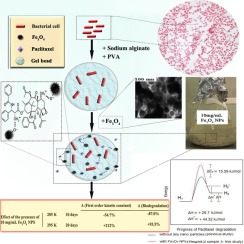当前位置:
X-MOL 学术
›
J. Hazard. Mater.
›
论文详情
Our official English website, www.x-mol.net, welcomes your feedback! (Note: you will need to create a separate account there.)
Two contrary roles of Fe3O4 nanoparticles on kinetic and thermodynamic of Paclitaxel degradation by Citrobacter amalonaticus Rashtia immobilized on sodium alginate gel beads
Journal of Hazardous Materials ( IF 13.6 ) Pub Date : 2017-10-31 , DOI: 10.1016/j.jhazmat.2017.10.061 Hojjatolah Zamani , Roohan Rakhshaee , Seyed Reza Garakoui
Journal of Hazardous Materials ( IF 13.6 ) Pub Date : 2017-10-31 , DOI: 10.1016/j.jhazmat.2017.10.061 Hojjatolah Zamani , Roohan Rakhshaee , Seyed Reza Garakoui

|
Roles of Fe3O4 nanoparticles (NPs) on biodegradation of Paclitaxel by Citrobacter amalonaticus immobilized on alginate gel beads were investigated. Limitation in substrate diffusion is the major drawback of the cell immobilization method. To overcome this problem, bacterial cells were immobilized on the gel beads containing different concentrations (5–20 mg/mL) of Fe3O4 NPs and their Paclitaxel degrading potential at different temperatures was investigated using kinetic and thermodynamic modeling. Co-immobilization of bacterial cells with 5, 10 and 20 mg/mL Fe3O4 NPs enhanced biodegradation efficiencies to 66%, 80% and 78%, respectively, compared to the NPs free immobilized cells (41.9%). The optimum concentration of Fe3O4 NPs (10 mg/mL) had both inhibitory and accelerating effects on paclitaxel degradation depending on the incubation time and temperature. Increasing dose of Fe3O4 NPs could increase paclitaxel degradation, despite increasing of thermodynamic inhibitory factors, only when longer time and higher temperature were used. ΔG values increased about 11.2 KJ/mol at all temperatures of 285, 295 and 305 K, and ΔH increased 54.4%, in comparison with the treatment without NPs. This indicates that, inclusion of Fe3O4 NPs into the immobilization gels can increase the local concentration of Paclitaxel (with OH2+ groups) and bacterial accessibility to the substrate and thus enhance biodegradation efficiency.
中文翻译:

Fe 3 O 4纳米粒子对固定在藻酸钠凝胶珠上的柠檬酸杆菌对紫杉醇降解动力学和热力学的两个相反作用
研究了Fe 3 O 4纳米颗粒(NPs)对固定在藻酸盐凝胶珠上的金黄色柠檬酸杆菌对紫杉醇生物降解的作用。底物扩散的限制是细胞固定方法的主要缺点。为了克服这个问题,将细菌细胞固定在含有不同浓度(5-20 mg / mL)的Fe 3 O 4 NPs的凝胶珠上,并使用动力学和热力学模型研究了它们在不同温度下的紫杉醇降解潜能。与5、10和20 mg / mL Fe 3 O 4共同固定细菌细胞与无NP的固定化细胞(41.9%)相比,NP将生物降解效率分别提高至66%,80%和78%。Fe 3 O 4 NPs的最佳浓度(10 mg / mL)对紫杉醇的降解具有抑制作用和促进作用,具体取决于培养时间和温度。尽管增加了热力学抑制因子,但增加Fe 3 O 4 NPs的剂量仍会增加紫杉醇的降解,只有在使用更长的时间和更高的温度时才可以。与不使用NP的处理相比,在285、295和305 K的所有温度下ΔG值均提高了约11.2 KJ / mol,而ΔH则提高了54.4%。这表明Fe 3 O 4的夹杂物 固定化凝胶中的NP可以增加紫杉醇的局部浓度(与 OH 2 +基团)和细菌与底物的可及性,从而提高了生物降解效率。
更新日期:2017-11-01
中文翻译:

Fe 3 O 4纳米粒子对固定在藻酸钠凝胶珠上的柠檬酸杆菌对紫杉醇降解动力学和热力学的两个相反作用
研究了Fe 3 O 4纳米颗粒(NPs)对固定在藻酸盐凝胶珠上的金黄色柠檬酸杆菌对紫杉醇生物降解的作用。底物扩散的限制是细胞固定方法的主要缺点。为了克服这个问题,将细菌细胞固定在含有不同浓度(5-20 mg / mL)的Fe 3 O 4 NPs的凝胶珠上,并使用动力学和热力学模型研究了它们在不同温度下的紫杉醇降解潜能。与5、10和20 mg / mL Fe 3 O 4共同固定细菌细胞与无NP的固定化细胞(41.9%)相比,NP将生物降解效率分别提高至66%,80%和78%。Fe 3 O 4 NPs的最佳浓度(10 mg / mL)对紫杉醇的降解具有抑制作用和促进作用,具体取决于培养时间和温度。尽管增加了热力学抑制因子,但增加Fe 3 O 4 NPs的剂量仍会增加紫杉醇的降解,只有在使用更长的时间和更高的温度时才可以。与不使用NP的处理相比,在285、295和305 K的所有温度下ΔG值均提高了约11.2 KJ / mol,而ΔH则提高了54.4%。这表明Fe 3 O 4的夹杂物 固定化凝胶中的NP可以增加紫杉醇的局部浓度(与 OH 2 +基团)和细菌与底物的可及性,从而提高了生物降解效率。



























 京公网安备 11010802027423号
京公网安备 11010802027423号